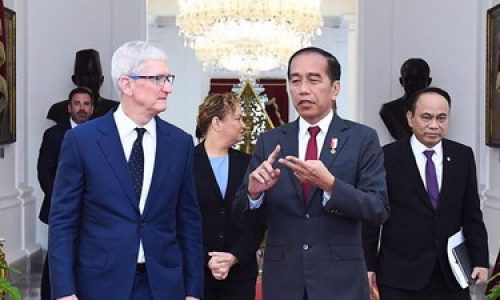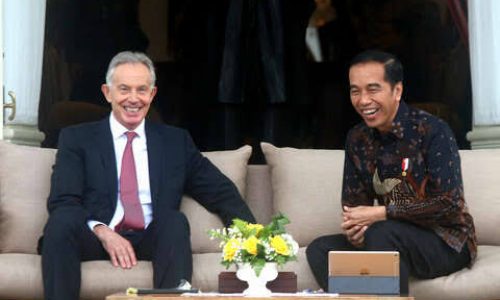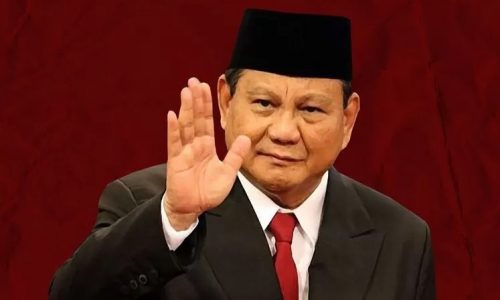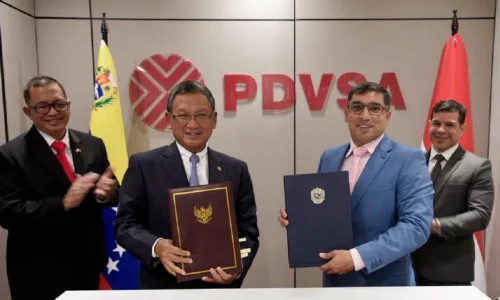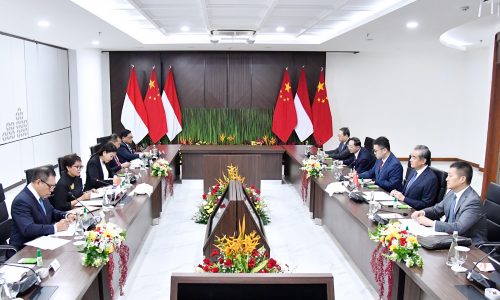Indonesia and Australia held a 2+2 meeting on February 8 and 9, 2023, in Canberra to delve into important foreign policy and defense/security matters both at the bilateral, regional and global levels.
Foreign Minister Retno LP Marsudi and Defense Minister Prabowo Subianto met with Australian Foreign Minister Penny Wong and Australian Defense Minister Richard Marles to discuss two major issues of:
- Regional dynamics: Discussions on the competition between major powers in the region, maritime security, the Association of Southeast Asian Nations (ASEAN) and the Pacific.
- Bilateral cooperation: Discussions on economic stability, cooperation in cyber security and defense policy.
Marsudi also met with her counterpart Penny Wong on strengthening the bilateral ties especially on the skilled migrant workers and the ease of obtaining visa for Indonesians traveling to Australia.
Both Marsudi and Prabowo also had bilateral meetings:
- Courtesy call to Australian Governor General David Hurley
- Brief talks with Prime Minister Anthony Albanese
- Meeting with Vice President of the World Bank for East Asia and the Pacific Manuela Ferro.
Regional dynamics
In the first agenda, the ministers highlighted several key points, including:
- Indonesia’s concern over the growing rivalry in the region
Indonesia is persistent in its invitation to Australia to join forces and serve as a positive influence in ensuring the stability, peace and prosperity of the Indo-Pacific region. The country has once again emphasized its outlook on the Indo-Pacific, which focuses on inclusive collaboration in economics and development. Indonesia emphasizes the significance of coordinated implementation of the ASEAN Outlook on Indo-Pacific (AOIP).
- The importance of respecting international law, particularly the 1982 UNCLOS
Indonesia emphasizes the significance of addressing non-traditional maritime challenges, particularly human trafficking and illegal, unreported and unregulated fishing, especially in the South China Sea. Both countries also highlight the role of regional cooperation mechanisms, such as the Bali Process, which is co-chaired by Indonesia and Australia, in overcoming these challenges.
- Priority of Indonesia’s chairmanship in ASEAN
Indonesia’s chairmanship priorities with the theme “ASEAN Matters, Epicentrum of Growth” has three main pillars, namely:
- ASEAN Matters Pillar: It highlights the significance of enhancing ASEAN’s competence, solidarity and centrality to ensure its continued relevance and importance to both the public and the global community.
- Epicentrum of Growth Pillar: It emphasizes the importance of making ASEAN remain the center of economic growth amidst the current gloomy global situation.
- AOIP Implementation Pillar: The concrete cooperation will continue to be encouraged in four priority areas, namely connectivity, maritime, SDGs (sustainable development goals) and other economic cooperation.
- Indonesia’s commitment to continuing to enhance its engagement with the Pacific
This commitment includes Triangular Cooperation with Australia and continues to increase Indonesia’s engagement with Pacific Islands Forum (PIF) and Melanesian Spearhead Group (MSG). Indonesia is striving to link the Pacific region with the wider Indo-Pacific region and the world as a whole. The country believes that it will lead to stability and prosperity in the Indo-Pacific region.
Bilateral cooperation
The second agenda has three highlighted points, comprising of:
- Continuous economic bilateral
The Indonesia-Australia Comprehensive Economic Partnership Agreement (CEPA) should serve as a valuable tool to strengthen economic ties between the two countries. Both countries also communicate Indonesia’s plan to further advance its downstream industry. Given this objective, Indonesia recognizes the potential for cooperation between the two countries, with Indonesia being the primary producer of nickel and Australia being the primary producer of lithium.
- Digital and cyber security
A bilateral matter of concern is the commitment of both parties to collaborate on cyber security and combat digital misinformation.
- Defense and security policy
Indonesia must take crucial steps towards establishing stability and peace in the wider region by enhancing its national defense and security. The country emphasized again the value of clear and open collaboration through AUKUS (Australia, the United Kingdom and the United States) and the significance of adhering to nuclear non-proliferation principles, including compliance with the NPT (Non-Proliferation Treaty) and the IAEA (International Atomic Energy Agency)’s Safeguards.
During a courtesy call with Hurley and Albanese, Marsudi also invited Australia to invest in the development of the Nusantara new capital (IKN). “We also invite Australian investment in the construction of IKN,” she added in the press briefing.
Indonesia-Australia complex history
Indonesia and Australia have a complex and challenging relationship, marked by both cooperation and competition. Bilateral cooperation between the two countries has a long history, dating back to the early 20th century when Australia provided aid and supported Indonesia during its struggle for independence.
In recent years, the relationship between Indonesia and Australia has been largely shaped by cooperation in trade, investment and security, as well as by competition in areas such as agriculture and resource extraction.
Despite some tensions, the two countries have been able to maintain a largely positive and productive relationship, with a number of high-level visits and agreements aimed at strengthening cooperation.
One area of particular significance in the relationship between Indonesia and Australia is the issue of East Timor (now known as Timor-Leste), which was a former Portuguese colony that was occupied by Indonesia from 1975 to 1999. The Indonesian military’s actions in East Timor led to widespread human rights abuses, and the issue remains a source of tension between the two countries.
Despite these challenges, the relationship between Indonesia and Australia has continued to evolve and grow as both countries work together in a number of areas, including trade and investment, defense and security and regional cooperation.
The signing of the Indonesia-Australia Comprehensive Economic Partnership Agreement (IA-CEPA) in 2019 was a major milestone in the bilateral relationship, as it opened up new opportunities for trade and investment between the two countries.



